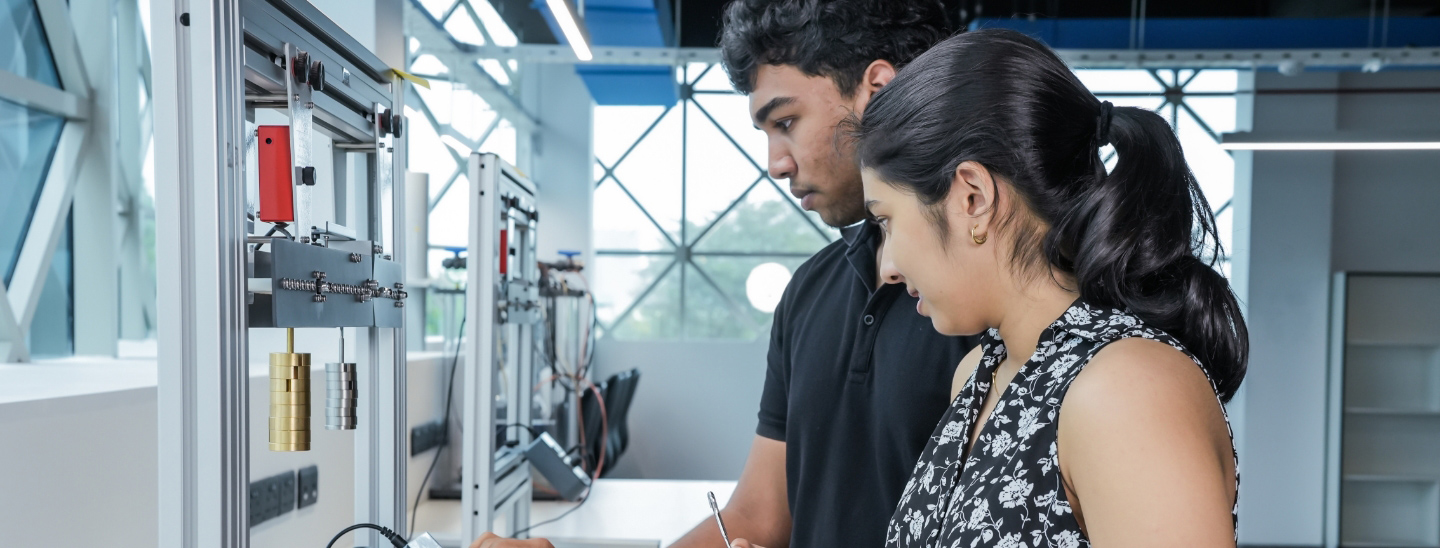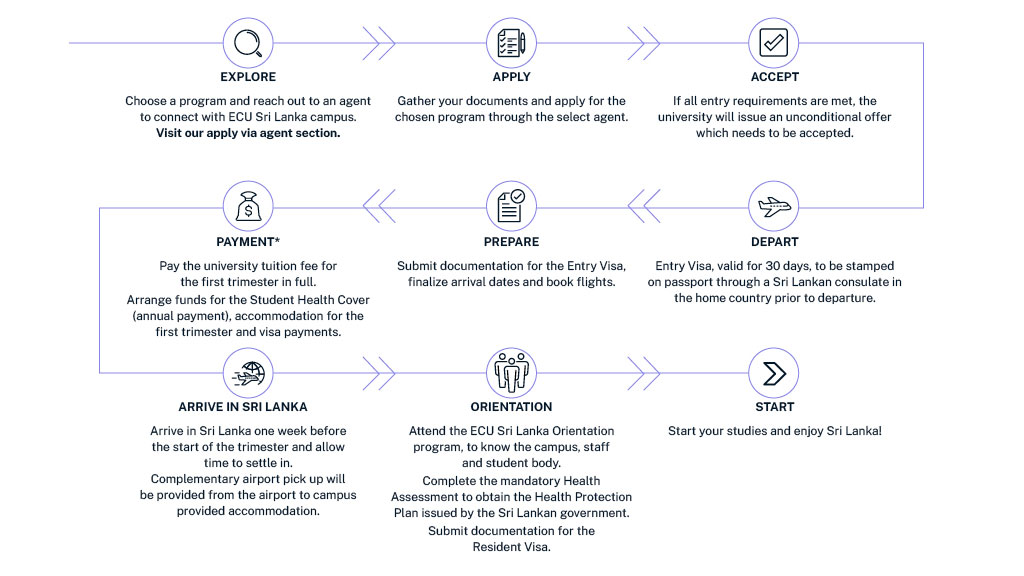It is compulsory that all international students have a valid student/resident visa when studying in Sri Lanka. Applying for the visa is easy and we are happy to support you through this process.

Remember to carry your cables for your electronic devices, but remember that Sri Lanka’s electrical sockets may be different from what you use at home. You can buy adaptors for your devices at the airport and various stores.
If you are bringing medication with you, please ensure that your prescriptions are up to date. It may be cheaper for you to do this before you leave your home country rather than in Sri Lanka but remember to travel with a doctor’s prescription listing your name to show the medicines are for your personal use.
If you forget anything or cannot fit it in your suitcase, you can buy everything else when you arrive. Shopping centres and convenience stores are located all around Sri Lanka, so you will be able to find one that is conveniently located to you.
We also recommend downloading the transport apps like Uber and PickMe that will make your initial travel easier.

It is compulsory that all international students have a valid student/resident visa when studying in Sri Lanka. Applying for the visa is easy and we are happy to support you through this process.
For further information on immigration please see https://www.immigration.gov.lk/
The documents mentioned below needs to be handed over to the admissions officers at ECU Sri Lanka, who will be facilitating the Entry and Resident Visa process.
Entry visa
Step 01
Step 02
Step 03
Step 04
Resident Visa
Step 01
Step 02
Step 03
Special note:
Applicable only for students arriving from Nigeria, Syria, Afghanistan, Pakistan, Egypt, Cameroon, Ghana, Ivory Coast, Bangladesh, Maldives, Iran and Turkey.
Prospective international students intending to study in Sri Lanka are required to obtain an entry visa before arriving in the country. Within 30 days of arrival, they must secure a residence visa specifically for educational purposes.
International students must submit the necessary documents, ensuring they allocate a minimum of three months for visa processing.
It’s important to note that a tourist or visit visa does not allow for the acquisition of a residence visa upon arrival. A visiting or tourist visa would also not allow you to commence your studies. You will enter the country with an Entry visa, which will be later converted to a student/resident visa.
The residence visa is initially valid for one year and can be extended.
It is your responsibility to renew or extend your visa as required, before it expires. You must present specific documents when applying for a student visa extension or renewal. A checklist and the required forms are available Sri Lanka immigration website – https://www.immigration.gov.lk/pages_e.php?id=18
It is important to open a bank account after arriving in Sri Lanka. There are number of state and private banks which are globally recognised and established in Sri Lanka.
You will be required to produce your passport, residence visa and other supporting documents as required by the respective bank in order to open the account.
Standard bank operating times are Monday – Friday between 09.00am and 3.00pm. These may vary slightly depending on the bank. ATMs are available across the country, which will make the withdrawal of money easy.
The official currency used in Sri Lanka is the Sri Lankan Rupee (LKR), which is divided into 100 cents (though cents are rarely used nowadays). Currency notes are available in denominations of LKR 5,000, LKR 1,000, LKR 500, LKR 100, LKR 50, LKR 20, and LKR 10. To verify the authenticity of notes received outside of banks, look for a watermark featuring a lion emblem.
Coin denominations range from LKR 1 to LKR 10. It is advisable to carry lower denomination notes and coins as obtaining can be challenging.
Sri Lanka, although it’s small in size offers many travel options. Sri Lanka boasts an extensive network of well-maintained roads, connecting all major cities and points of student interest. With smooth, paved surfaces throughout, students can easily traverse the island and reach any destination within just a few hours, making exploration and travel convenient and efficient.
Buses connect the majority of the country and has both public and private buses. These are widely available and the most affordable transport option. Both public and private buses in Sri Lanka typically collect fares on board, either from the driver or the conductor. In some cases, smaller private bus operators may sell tickets just outside the bus before boarding.
Tuk-tuks, are an iconic mode of transportation ideal for short distances in Sri Lanka. Found in abundance across major cities and small towns alike, tuk-tuks offer a convenient way to navigate through the country. Before embarking on your journey, it’s advisable to check if the tuk-tuk is metered if not it is best to negotiate and agree upon the fare with the driver. Once settled, you can relax and soak in the lively ambience of your surroundings, including the vibrant sounds and aromatic scents unique to travelling by tuk-tuk.
Taxis/Cabs with a driver are also available to choose from and can be the most convenient way to travel however will also have a higher price tag.
Self-driving will give you more flexibility and independence in exploring the country at your own pace. There are multiple service providers who offer vehicles on short or long-term rentals. All you need is a valid International Driving Permit and a map for navigation.
Trains connect most main cities in the country. Some trains would need advance booking; however most tickets can be purchased on the day of travel. This is a slower mode and also can be restrictive as a result of the limitations in the destinations. It is still an enjoyable ride which definitely has to be experienced.
An international License and a permit from the Automobile Association of Ceylon (https://aaceylon.lk/services/idp/) are required if you wish to drive in Sri Lanka.
For further information on driving in Sri Lanka see https://aaceylon.lk/
The following apps can help you navigate Sri Lanka which will allow you to book a tuk-tuk or even get a late night snack.
Uber – transport app, has many vehicle options from tuk-tuks to sedans to vans
PickMe – transport app, has many vehicle options from tuk-tuks to sedans to vans
Kangaroo Cabs – transport app, has many vehicle options from mini-cars, sedans to vans
Uber Eats – food delivery service app, connected to majority of the restaurants in the main cities